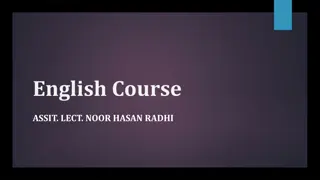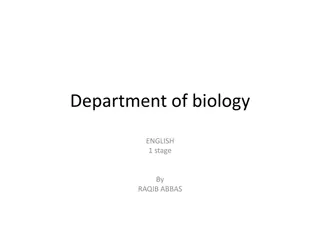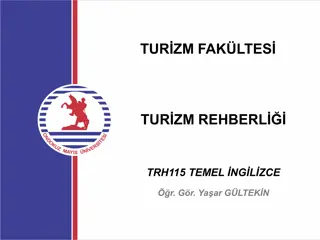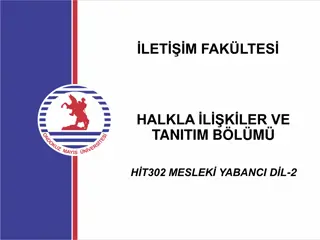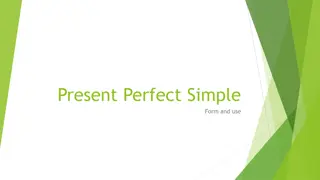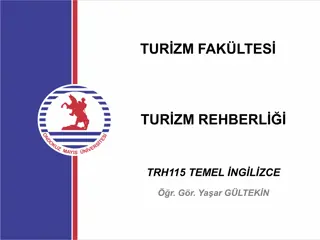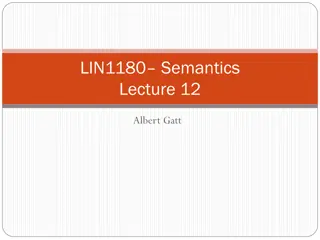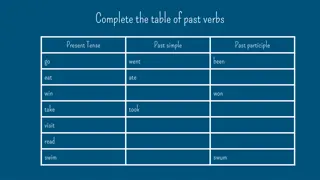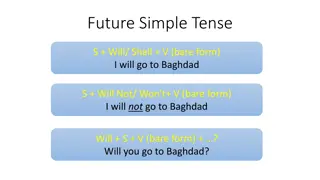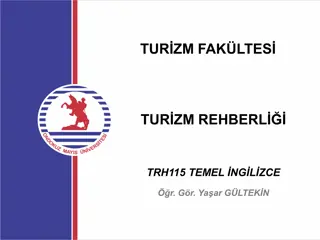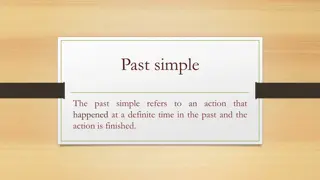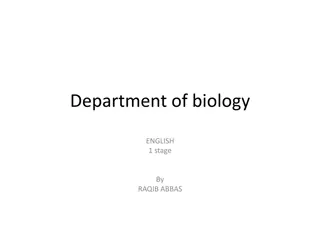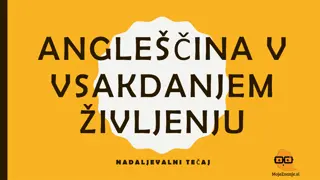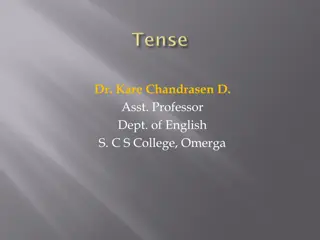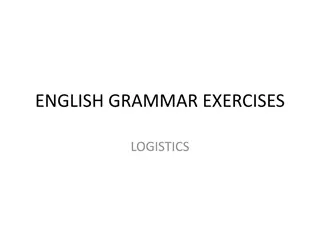Understanding Tense in English Grammar
Explore the different types of tenses such as Present, Past, and Future Tense along with their classifications like Present Indefinite Tense, Past Continuous Tense, and Future Perfect Tense. Learn how to form positive and negative sentences in each tense with examples. Enhance your knowledge of English grammar with practical insights on using tenses correctly.
Download Presentation

Please find below an Image/Link to download the presentation.
The content on the website is provided AS IS for your information and personal use only. It may not be sold, licensed, or shared on other websites without obtaining consent from the author. Download presentation by click this link. If you encounter any issues during the download, it is possible that the publisher has removed the file from their server.
E N D
Presentation Transcript
What do you see in these picture and answers these question? What are they doing? When did he getup from bed? When will they go to school?
Todays Lesson Tense
Tense Tense, in English grammar, refers to the time of an action or event. It tells when the work is done. It identifies whether the work is done in the present, the past or the future. There are three types of Tenses *Present Tense: *Past Tense: Past tense expressing an action that has happened or a state that previously existed. *Future Tense : Future tense expressing an action that has not yet happened or a state that does not yet exist. Example: I eat Rice/He eats rice. (Present Tense) I ate rice/He ate rice. (Past Tense) I shall eat rice/He will eat rice. (Future Tense)
Classification of Tense There four types of Present Tense 1. Present Indefinite Tense or Simple Present 2. Present Continuous Tense 3. Present Perfect Tense 4. Present Perfect Continuous Tense There four types of Past Tense 1. Past Indefinite Tense or Simple Past 2. Past Continuous Tense 3 Past Perfect Tense 4 Past Perfect Continuous Tense There four types of Future Tense 1. Future Indefinite Tense or Simple Future 2. Future Continuous Tense 3. Future Perfect Tense 4. Future Perfect Continuous Tense
Present Indefinite Tense It describes an action that is true, regular or normal. It uses the main verb or base form of the verb or the root verb. Example: I go to School .He goes to school . They play cricket . Structure of the sentence: Base/root form of the verb is used as the main verb. Positive Sentence: Subject + main verb + complement Note: In a sentence, if the subject is a third person singular number (he, she, it, or a singular noun), then s , es , ies is added with the main verb in the sentence. But, if the subject is plural, there will be no addition of s , es , or ies .
Example: I go to the market. (using the root form go ) He goes to the market. (root form of the verb is go but he is a third person singular number that s why an extra es is added with the verb) Hasina wants a cup of tea. (Hasina is third person singular number) The boys play cricket. ( the boys = a third person plural number, that s why there is no s with the verb) Negative Sentence: Subject + Do not/Does not + main verb + object Note: If the subject is he/she/it or a singular noun then Does not will be used to make it negative. If the subject of a sentence is I/you/we/they or a plural noun, then Do not will be used to make it negative.
Example: Positive: I eat rice. Negative: I do not eat rice. Positive: He goes to School. Negative: He does not go to School. Positive: He walks in the evening. Negative: He does not walk in the evening. Positive: They like to dance. Negative: They do not like to dance. Question Sentence: Do/ Does + Subject + Main verb + Object + Note of interrogation (?) Note: If the sentence starts with the subject he/she/it or a singular noun then Does is used to make it Interrogative. If the sentence starts with the subject I/we/you/they or a plural noun then Do is used to make it Interrogative.
Example: Positive: He sings a song. Interrogative: Does he sing a song? Positive: She likes to talk to you. Interrogative: Does she like to talk to you? Positive: We try to do the assignment. Interrogative: Do we try to do the assignment? Positive: They love you. Interrogative: Do they love you? Using Be verb (am/is/are): Subject + be verb (am/is/are) + object Note: am is used with the subject I . is is used with the subject he/she/it or the singular form of nouns. are is used with the we/you/they or the plural form of nouns.
Example: I am a musician. It is my pen You are a fraud. Negative sentence: Subject + am not/is not/are not + object Example: Positive: I am a good boy. Negative: I am not a good boy. Positive: It is her book. Negative: It is not her book. Positive: You are my friend. Negative: You are not my friend. Interrogative: Am/is/are + subject + object + Note of Interrogation (?) Example: Positive: I am an intelligent boy. Interrogative: Am I an intelligent boy? Positive: He is angry. Interrogative: Is he angry? Positive: They are my friends. Interrogative: Are they my friends?
Present Continuous Tense The present continuous tense designates an action that is being continued or going to be continued in the near future. Example: I am going to school . He is going to market . They are playing football . The bus is leaving at 4.00 pm . .
Positive sentence: Subject + am/is/are + main verb + ing + object Example: I am eating rice. He is running to and fro. They are going to school. They are going to attend a party tonight.
Negative sentence: Subject + am/is/are + not + Main verb + ing + object Example: He is not drinking milk. I m not going to open a bank account. They are not going to play football. Interrogative sentence: Am/is/are + subject + main verb + ing + object + ? Example: Am I going to Chittagong? Is he drinking water? Are they playing badminton?
Present Perfect Tense It describes the work which has been done, but the effect exists till now. Example: He has done the work . I have gone to the market . They have eaten mangoes . I have not eaten banana . Structure of the sentence: The past participle form of the verb is used after have/has. Positive sentence: Subject + have/has + past participle form of verb + object
Example: He has done the work. I have eaten rice. They have worked hard. Negative sentence: Subject + have/has + not + past participle form of verb + object Example: He has not eaten rice. They have not come to our house. I have not gone to school. Interrogative sentence: Have/has + subject + past participle form of verb + object + ? Example: Has he done the homework? Have they gone to school? Have you learned speaking English?
Present Perfect Continuous Tense The work started in the past and it is still running is called Present perfect continuous tense. Example: I have been walking for two hours He has been working in this office for five years They have been suffering from fever since Tuesday Note: For is used to talk about a period of time: three hours, three months, twelve years, etc. For can be used with all tenses. Since is used to talk about a point in past time: Sunday, 6th January, Morning, etc. Since can be used only in perfect tenses. Structure of the sentence : Positive sentence: Subject + have been/has been + main verb + ing + since/from/for + object.
Example: He has been reading this newspaper for two hours. They have been walking since 7 am. You have been talking about the Internet for three hours. Negative sentence: Subject + have not/has not + been + main verb + ing + since/from/for + object. Example: I have not been walking for two hours. It has not been raining.
Interrogative sentence: Have/has + subject + been + main verb + ing + since/for (if needed) + object + ? Example: Has he been watching the movie? Have they been waiting for two hours? Has it been raining since morning?




